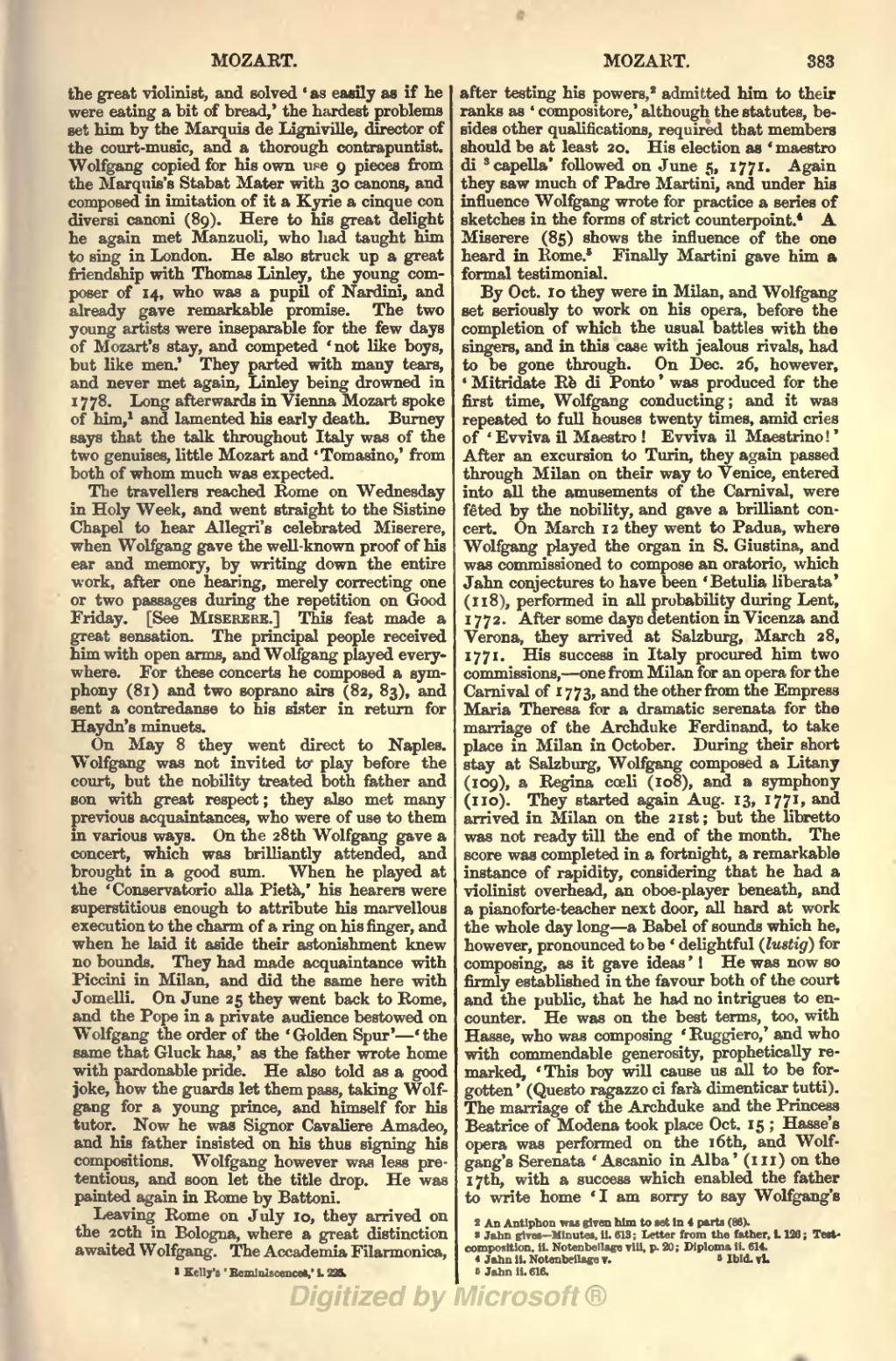the great violinist, and solved 'as easily as if he were eating a bit of bread,' the hardest problems set him by the Marquis de Ligniville, director of the court-music, and a thorough contrapuntist. Wolfgang copied for his own use 9 pieces from the Marquis's Stabat Mater with 30 canons, and composed in imitation of it a Kyrie a cinque con diversi canoni (89). Here to his great delight he again met Manzuoli, who had taught him to sing in London. He also struck up a great friendship with Thomas Linley, the young composer of 14, who was a pupil of Nardini, and already gave remarkable promise. The two young artists were inseparable for the few days of Mozart's stay, and competed 'not like boys, but like men.' They parted with many tears, and never met again, Linley being drowned in 1778. Long afterwards in Vienna Mozart spoke of him,[1] and lamented his early death. Burney says that the talk throughout Italy was of the two genuises, little Mozart and 'Tomasino,' from both of whom much was expected.
The travellers reached Rome on Wednesday in Holy Week, and went straight to the Sistine Chapel to hear Allegri's celebrated Miserere, when Wolfgang gave the well-known proof of his ear and memory, by writing down the entire work, after one hearing, merely correcting one or two passages during the repetition on Good Friday. [See Miserere.] This feat made a great sensation. The principal people received him with open arms, and Wolfgang played everywhere. For these concerts he composed a symphony (81) and two soprano airs (82, 83), and sent a contredanse to his sister in return for Haydn's minuets.
On May 8 they went direct to Naples. Wolfgang was not invited to play before the court, but the nobility treated both father and son with great respect; they also met many previous acquaintances, who were of use to them in various ways. On the 28th Wolfgang gave a concert, which was brilliantly attended, and brought in a good sum. When he played at the 'Conservatorio alla Pietà,' his hearers were superstitious enough to attribute his marvellous execution to the charm of a ring on his finger, and when he laid it aside their astonishment knew no bounds. They had made acquaintance with Piccini in Milan, and did the same here with Jomelli. On June 25 they went back to Rome, and the Pope in a private audience bestowed on Wolfgang the order of the 'Golden Spur'—'the same that Gluck has,' as the father wrote home with pardonable pride. He also told as a good joke, how the guards let them pass, taking Wolfgang for a young prince, and himself for his tutor. Now he was Signor Cavaliere Amadeo, and his father insisted on his thus signing his compositions. Wolfgang however was less pretentious, and soon let the title drop. He was painted again in Rome by Battoni.
Leaving Rome on July 10, they arrived on the 2Oth in Bologna, where a great distinction awaited Wolfgang. The Accademia Filarmonica, after testing his powers,[2] admitted him to their ranks as 'compositore,' although the statutes, besides other qualifications, required that members should be at least 20. His election as 'maestro di [3]capella' followed on June 5, 1771. Again they saw much of Padre Martini, and under his influence Wolfgang wrote for practice a series of sketches in the forms of strict counterpoint.[4] A Miserere (85) shows the influence of the one heard in Rome.[5] Finally Martini gave him a formal testimonial.
By Oct. 10 they were in Milan, and Wolfgang set seriously to work on his opera, before the completion of which the usual battles with the singers, and in this case with jealous rivals, had to be gone through. On Dec. 26, however, 'Mitridate Rè di Ponto' was produced for the first time, Wolfgang conducting; and it was repeated to full houses twenty times, amid cries of 'Evviva il Maestro! Evviva il Maestrino!' After an excursion to Turin, they again passed through Milan on their way to Venice, entered into all the amusements of the Carnival, were feted by the nobility, and gave a brilliant concert. On March 12 they went to Padua, where Wolfgang played the organ in S. Giustina, and was commissioned to compose an oratorio, which Jahn conjectures to have been 'Betulia liberata' (118), performed in all probability during Lent, 1772. After some days detention in Vicenza and Verona, they arrived at Salzburg, March 28, 1771. His success in Italy procured him two commissions, one from Milan for an opera for the Carnival of 1773, and the other from the Empress Maria Theresa for a dramatic serenata for the marriage of the Archduke Ferdinand, to take place in Milan in October. During their short stay at Salzburg, Wolfgang composed a Litany (109), a Regina cœli (108), and a symphony (110). They started again Aug. 13, 1771, and arrived in Milan on the 21st; but the libretto was not ready till the end of the month. The score was completed in a fortnight, a remarkable instance of rapidity, considering that he had a violinist overhead, an oboe-player beneath, and a pianoforte-teacher next door, all hard at work the whole day long—a Babel of sounds which he, however, pronounced to be 'delightful (lustig) for composing, as it gave ideas'! He was now so firmly established in the favour both of the court and the public, that he had no intrigues to encounter. He was on the best terms, too, with Hasse, who was composing 'Ruggiero,' and who with commendable generosity, prophetically remarked, 'This boy will cause us all to be forgotten' (Questo ragazzo ci farà dimenticar tutti). The marriage of the Archduke and the Princess Beatrice of Modena took place Oct. 15; Hasse's opera was performed on the 16th, and Wolfgang's Serenata 'Ascanio in Alba' (111) on the 17th, with a success which enabled the father to write home [6]'I am sorry to say Wolfgang's
